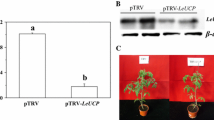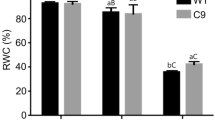Abstract
To obtain a better understanding of the function of mitochondrial uncoupling protein (UCP) in higher plants, the wheat gene for mitochondrial uncoupling protein (WhUCP) in rice was overexpressed by Agrobacterium-mediated transformation with a construct containing the WhUCP ORF under control of the 35S promoter. The transgenic rice plants showed a significant increase in tolerance against oxidative stress promoted by exogenous hydrogen peroxide at the seedling stage. The transgenic rice plants overexpressing WhUCP also exhibited greater tolerance against cold stress than did the wild-type plants. These results demonstrated that the mitochondrial UCP in higher plants is positively involved in the pathway for abiotic stress tolerance, probably through a decrease in cellular oxidative damage, and that controlled uncoupling by UCP could be used for improvement of stress tolerance in higher plants.
Similar content being viewed by others
References
Brand MD (2000) Uncoupling to survive? The role of mitochondrial inefficiency in ageing. Exp Gerontol 35:811–820
Brandalise M, Maia IG, Borecky J, Vercesi AE, Arruda P (2003a) ZmPUMP encodes a maize mitochondrial uncoupling protein that is induced by oxidative stress. Plant Sci 165:329–335
Brandalise M, Maia IG, Borecky J, Vercesi AE, Arruda P (2003b) Overexpression of plant uncoupling mitochondrial protein in transgenic tobacco increases tolerance to oxidative stress. J Bioenerg Biomembr 35:203–209
Considine MJ, Goodman M, Echtay KS, Laloi M, Whelan J, Brand MD, Sweetlove LJ (2003) Superoxide stimulates a proton leak in potato mitochondria that is related to the activity of uncoupling protein. J Biol Chem 278:22298–22302
Ito K (1999) Isolation of two distinct cold-inducible cDNAs encoding plant uncoupling proteins from the spadix of skunk cabbage (Symplocarpus foetidus). Plant Sci 149:167–173
Jezek P (2002) Possible physiological roles of mitochondrial uncoupling proteins-UCPn. Int J Biochem Cell Biol 34:1190–1206
Laloi M, Klein M, Reismeier JW, Muller-Rober B, Fleury C, Bouillaud F, Ricquier D (1997) A plant cold-induced uncoupling protein. Nature 389:135–136
Maia IG, Benedetti CE, Leite A, Turcinelli SR, Vercesi AE, Arruda P (1998) AtPUMP: an Arabidopsis gene encoding a plant uncoupling mitochondrial protein. FEBS Lett 429:403–406
Mitsuhara I, Ugaki M, Hirochika H, Ohshima M, Murakami T, Gotoh Y, Katayose Y, Nakamura S, Honkura R, Nishimiya S, Ueno K, Mochizuki A, Tanimoto H, Tsugawa H, Otsuki Y, Ohashi Y (1996) Efficient promoter cassettes for enhanced expression of foreign genes in dicotyledonous and monocotyledonous plants. Plant Cell Physiol 37:49–59
Mochizuki A, Nishizawa Y, Onodera H, Tabei Y, Toki S, Habu Y, Ugaki M, Ohashi Y (1999) Transgenic rice plants expressing a trypsin inhibitor are resistant against rice stem borers, Chilo suppressalis. Entomol Exp Appl 93:173–178
Murayama S, Handa H (2000) Isolation and characterization of cDNAs encoding mitochondrial uncoupling proteins in wheat: wheat UCP genes are not regulated by low temperature. Mol Gen Genet 264:112–118
Pastore D, Fratianni A, Di Pede S, Passarella S (2000) Effects of fatty acids, nucleotides and reactive oxygen species on durum wheat mitochondria. FEBS Lett 470:88–92
Prasad TK, Anderson MD, Martin BA, Stewart CR (1994a) Evidence for chilling-induced oxidative stress in maize seedlings and a regulatory role for hydrogen peroxide. Plant Cell 6:65–74
Prasad TK, Anderson MD, Stewart CR (1994b) Acclimation, hydrogen peroxide and abscisic acid protect mitochondria against irreversible chilling injury in maize seedlings. Plant Physiol 105:619–627
Skulachev VP (1998) Uncoupling: new approaches to an old problem of bioenergetics. Biochim Biophys Acta 1363:100–124
Smith AMO, Ratcliffe RG, Sweetlove LJ (2004) Activation and function of mitochondrial uncoupling protein in plants. J Biol Chem 279:51944–51952
Tanaka H, Kayano T, Ugaki M, Shiobara F, Onodera H, Ono K, Tagiri A, Nishizawa Y, Shibuya N (2001) Ultra-Fast Transformation Technique for Monocotyledons. PCT Application WO 01/06844 A1
Vercesi AE, Martins IS, Silva MAP, Leite HMF, Cuccovia IM, Chaimovich H (1995) PUMPing plants. Nature 375:24
Watanabe A, Nakazono M, Tsutsumi N, Hirai A (1999) AtUCP2: a novel isoform of the mitochondrial uncoupling protein of Arabidopsis thaliana. Plant Cell Physiol 40:1160–1166
Watanabe A, Hirai A (2002) Two uncoupling protein genes of rice (Oryza sativa L.): molecular study reveals the defects in the pre-mRNA processing for the heat-generating proteins of the subtropical cereal. Planta 215:90–100
Acknowledgments
We are grateful to Drs. Y. Ohashi and I. Mitsuhara, NIAS for providing the expression vector pMLH7133. This work was supported in part by a research grant (Research Project for Development of Innovative Transgenic Plants) from the Ministry of Agriculture, Forestry and Fisheries of Japan to K.O. and H.H.
Author information
Authors and Affiliations
Corresponding author
Additional information
Kenjirou Ozawa and Seiji Murayama are contributed equally to the work
Rights and permissions
About this article
Cite this article
Ozawa, K., Murayama, S., Kobayashi-Uehara, A. et al. Overexpression of wheat mitochondrial uncoupling protein in rice plants confers tolerances to oxidative stresses promoted by exogenous hydrogen peroxide and low temperature. Mol Breeding 18, 51–56 (2006). https://doi.org/10.1007/s11032-006-9015-4
Received:
Accepted:
Published:
Issue Date:
DOI: https://doi.org/10.1007/s11032-006-9015-4




